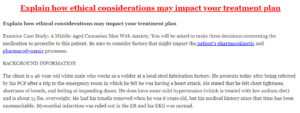Explain how ethical considerations may impact your treatment plan
Explain how ethical considerations may impact your treatment plan
Explain how ethical considerations may impact your treatment plan 
Examine Case Study: A Middle-Aged Caucasian Man With Anxiety. You will be asked to make three decisions concerning the medication to prescribe to this patient. Be sure to consider factors that might impact the patient’s pharmacokinetic and pharmacodynamic processes.
BACKGROUND INFORMATION
The client is a 46-year-old white male who works as a welder at a local steel fabrication factory. He presents today after being referred by his PCP after a trip to the emergency room in which he felt he was having a heart attack. He stated that he felt chest tightness, shortness of breath, and feeling of impending doom. He does have some mild hypertension (which is treated with low sodium diet) and is about 15 lbs. overweight. He had his tonsils removed when he was 8 years old, but his medical history since that time has been unremarkable. Myocardial infarction was ruled out in the ER and his EKG was normal.
Explain how ethical considerations may impact your treatment plan
Remainder of physical exam was WNL.
He admits that he still has problems with tightness in the chest and episodes of shortness of breath- he now terms these “anxiety attacks.” He will also report occasional feelings of impending doom, and the need to “run” or “escape” from wherever he is at.
In your office, he confesses to occasional use of ETOH to combat worries about work. He admits to consuming about 3-4 beers/night. Although he is single, he is attempting to care for aging parents in his home. He reports that the management at his place of employment is harsh, and he fears for his job. You administer the HAM-A, which yields a score of 26.
Client has never been on any type of psychotropic medication.
Diagnosis: Generalized anxiety disorder
RESOURCES§ Hamilton, M. (1959). Hamilton Anxiety Rating Scale. Psyctests, doi:10.1037/t02824-0Decision Point OneSelect what you should do:
Begin Zoloft 50 mg po daily
Begin Imipramine 25 mg po BID
Begin Buspirone 10 mg po BID2.
Assignment: Assessing and Treating Patients With Psychosis and Schizophrenia: BACKGROUNDThe client is a 34-year-old Pakistani female who moved to the United States in her late teens/early 20s. She is currently in an “arranged” marriage (her husband was selected for her when she was 9 years old). She presents following a 21-day hospitalization for what was diagnosed as “brief psychotic disorder.” She was given this diagnosis as her symptoms have persisted for less than 1 month.
Prior to admission, she was reporting visions of Allah, and over the course of a week, she believed that she was the prophet Mohammad. She believed that she would deliver the world from sin. Her husband became concerned about her behavior to the point that he was afraid of leaving their 4 children with her. One evening, she was “out of control,” which resulted in his calling the police and her subsequent admission to an inpatient psych unit.
During today’s assessment, she appears quite calm and insists that the entire incident was “blown out of proportion.” She denies that she believed herself to be the prophet Mohammad and states that her husband was just out to get her because he never loved her and wanted an “American wife” instead of her. She says she knows this because the television is telling her so.
She currently weighs 140 lbs., and she is 5’ 5.
SUBJECTIVE
Client reports that her mood is “good.” She denies auditory/visual hallucinations but believes that the television talks to her. She believes that Allah sends her messages through the TV. At times throughout the clinical interview, she becomes hostile towards you but then calms down.
A review of her hospital records shows that she received a medical workup from physician, who reported her to be in overall good health. Lab studies were all within normal limits.
Client admits that she stopped taking her Risperdal about a week after she got out of the hospital because she thinks her husband is going to poison her so that he can marry an American woman.
MENTAL STATUS EXAM
The client is alert and oriented to person, place, time, and event. She is dressed appropriately for the weather and time of year. She demonstrates no noteworthy mannerisms, gestures, or tics. Her speech is slow and, at times, interrupted by periods of silence. Self-reported mood is euthymic.
Affect is constricted. Although the client denies visual or auditory hallucinations, she appears to be “listening” to something. Delusional and paranoid thought processes as described above. Insight and judgment are impaired. She is currently denying suicidal or homicidal ideation.
You administer the PANSS which reveals the following scores:-40 for the positive symptoms scale-20 for the negative symptom scale-60 for general psychopathology scaleDiagnosis: Schizophrenia, paranoid type
Decision Point One
Select what you should do:
Start Zyprexa (olanzapine) 10 mg orally at BEDTIME
Start Invega Sustenna 234 mg IM X1 followed by 156 mg IM on day 4 and monthly thereafter
Start Abilify (aripiprazole) 10 mg orally at BEDTIMEDecision #1 (1 page)Which decision did you select?
Why did you select this decision? Be specific and support your response with clinically relevant and patient-specific resources, including the primary literature.
Why did you not select the other two options provided in the exercise? Be specific and support your response with clinically relevant and patient-specific resources, including the primary literature.
What were you hoping to achieve by making this decision? Support your response with evidence and references to the Learning Resources (including the primary literature).
Explain how ethical considerations may impact your treatment plan and communication with patients. Be specific and provide examples.
Decision #2 (1 page)Why did you select this decision? Be specific and support your response with clinically relevant and patient-specific resources, including the primary literature.
Why did you not select the other two options provided in the exercise? Be specific and support your response with clinically relevant and patient-specific resources, including the primary literature.
What were you hoping to achieve by making this decision? Support your response with evidence and references to the Learning Resources (including the primary literature).
Explain how ethical considerations may impact your treatment plan and communication with patients. Be specific and provide examples.
3. Assignment 2: Assessing and Treating Patients With Sleep/Wake Disorders:
The Assignment: 5 pages
Examine Case Study: Pharmacologic Approaches to the Treatment of Insomnia in a Younger Adult. You will be asked to make three decisions concerning the medication to prescribe to this patient. Be sure to consider factors that might impact the patient’s pharmacokinetic and pharmacodynamic processes.
At each decision point, you should evaluate all options before selecting your decision and moving throughout the exercise. Before you make your decision, make sure that you have researched each option and that you evaluate the decision that you will select. Be sure to research each option using the primary literature.
Introduction to the case (1 page)
Briefly explain and summarize the case for this Assignment. Be sure to include the specific patient factors that may impact your decision making when prescribing medication for this patient.
BACKGROUND
This week, we examine a 31-year-old male who presents to the office with a chief complaint of insomnia.
SUBJECTIVE
Patient is a 31-year-old male. He states that his insomnia has gotten progressively worse over the past 6 months. Per the patient, he has never been a “great sleeper” but is now having difficulty both falling asleep and staying asleep at night. The problem began approximately 6 months ago after the sudden loss of his fiancé. The patient states this is affecting his ability to perform his job, which is a forklift operator at a local chemical company. The patient states he has used diphenhydramine in the past to sleep but does not like the way it makes him feel the morning after. He states he has fallen asleep on the job due to lack of sleep from the night before. The patient’s medical record from his previous physician states that he has a history of opiate abuse, which began after he broke his ankle in a skiing accident and was prescribed hydrocodone/apap (acetaminophen) for acute pain management. The patient has not received a prescription for an opiate analgesic in 4 years. The patient states recently he has been using alcohol to help him fall asleep, approximately four beers prior to bed.
MENTAL STATUS EXAM
The patient is alert and oriented to person, place, time, event. He makes good eye contact and is dressed appropriately for time of year. He denies auditory/visual hallucinations. Judgement, insight, and reality contact are all intact. Patient denies suicidal/homicidal ideation, and is future oriented.
Decision Point One Select what you should do:
Zolpidem: 10 mg daily at bedtime
Trazodone: 50–100 mg daily at bedtime
Hydroxyzine: 50 mg daily at bedtime
4. Assignment: Assessing and Treating Patients With ADHD:
BACKGROUND
Katie is an 8 year old Caucasian female who is brought to your office today by her mother & father. They report that they were referred to you by their primary care provider after seeking her advice because Katie’s teacher suggested that she may have ADHD. Katie’s parents reported that their PCP felt that she should be evaluated by psychiatry to determine whether or not she has this condition.
The parents give you a copy of a form titled “Conner’s Teacher Rating Scale-Revised”. This scale was filled out by Katie’s teacher and sent home to the parents so that they could share it with their family primary care provider. According to the scoring provided by her teacher, Katie is inattentive, easily distracted, forgets things she already learned, is poor in spelling, reading, and arithmetic. Her attention span is short, and she is noted to only pay attention to things she is interested in. The teacher opined that she lacks interest in school work and is easily distracted. Katie is also noted to start things but never finish them, and seldom follows through on instructions and fails to finish her school work.
Katie’s parents actively deny that Katie has ADHD. “She would be running around like a wild person if she had ADHD” reports her mother. “She is never defiant or has temper outburst” adds her father.
SUBJECTIVE
Katie reports that she doesn’t know what the “big deal” is. She states that school is “OK”- her favorite subjects are “art” and “recess.” She states that she finds her other subjects boring, and sometimes hard because she feels “lost”. She admits that her mind does wander during class to things that she thinks of as more fun. “Sometimes” Katie reports “I will just be thinking about nothing and the teacher will call my name and I don’t know what they were talking about.”
Katie reports that her home life is just fine. She reports that she loves her parents and that they are very good and kind to her. Denies any abuse, denies bullying at school. Offers no other concerns at this time.
MENTAL STATUS EXAM
The client is an 8 year old Caucasian female who appears appropriately developed for her age. Her speech is clear, coherent, and logical. She is appropriately oriented to person, place, time, and event. She is dressed appropriately for the weather and time of year. She demonstrates no noteworthy mannerisms, gestures, or tics. Self-reported mood is euthymic. Affect is bright. Katie denies visual or auditory hallucinations, no delusional or paranoid thought processes readily appreciated. Attention and concentration are grossly intact based on Katie’s attending to the clinical interview and her ability to count backwards from 100 by serial 2’s and 5’s. Insight and judgment appear age appropriate. Katie denies any suicidal or homicidal ideation.Diagnosis: Attention deficit hyperactivity disorder, predominantly inattentive presentation
Decision Point One
Select what you should do:
Begin Wellbutrin (bupropion) XL 150 mg orally dailyBegin Intuniv extended release 1 mg orally at BEDTIME
Begin Ritalin (methylphenidate) chewable tablets 10 mg orally in the MORNING
Use the following coupon code :
premiernursingpapers


